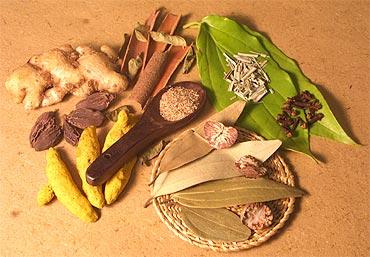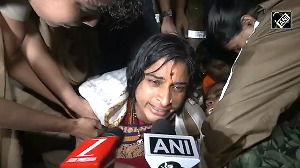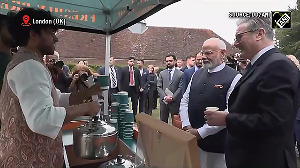 The permeating take-away by a high-powered American delegation of top-notch American educators and researchers which returned from a study-tour of ayurveda in India, was the paucity of an evidence-based approach which is imperative if these ancient herbal remedies were to be incorporated in the US medical curricula.
The permeating take-away by a high-powered American delegation of top-notch American educators and researchers which returned from a study-tour of ayurveda in India, was the paucity of an evidence-based approach which is imperative if these ancient herbal remedies were to be incorporated in the US medical curricula.In interviews with rediff.com, members of the delegation from six major medical schools, including Harvard, Johns Hopkins and Georgetown, said that yet another significant observation was the lack of a formal interaction between allopathic and ayurvedic medicine.
The members of the delegation were Drs David Eisenberg, Director, Osher Research Center and Director, Division for Research and Education in Integrative Medical Therapies, Harvard Medical School; Aviad Haramati, Professor and Director of Education, Department of Physiology and Biophysics, Georgetown University School of Medicine; Anastasia Rowland-Seymour, Assistant Professor of Medicine, Integrative Medicine, Department of Medicine, Johns Hopkins University; Benjamin Kligler, Vice-Chair, Beth Israel Department of Integrative Medicine, Co-Director of Fellowship Programs, Research Director, Continuum Center for Health and Healing and Associate Professor, Department of Family and Social Medicine, Albert Einstein College of Medicine; Victoria Maizes, Executive Director, Arizona Center for Integrative Medicine and Associate Professor, Medicine, Family Medicine and Public Health, University of Arizona College of Medicine; and Anne Nedrow, Associate Professor and Director, Oregon Health and Science University's Center for Women's Health and Primary Care and Integrative Medicine, OSHU School of Medicine.
Leading the delegation was Dr Navin Shah, former president of AAPI and a practising urologist in Maryland, who had put the delegation together after several years of lobbying the government of India to sponsor such a visit so that these experts on complementary and alternative medicines could study the credibility and utility of ayurveda. If convinced, the delegation wanted to consequently bring it into the mainstream of medical research and study in US.
Eisenberg, who recently served as the adviser to the NIH, the Food and Drug Administration and the Federation of State Medical Boards with regard to complementary, alternative and integrative medicine research, education and policy, said, "I was struck by the observation that formal interaction between allopathic and ayurvedic clinical researchers, basic scientist and their respective institutions is limited in India at this point of time."
"One might argue that for a traditional medical system to be thoughtfully, respectfully, yet vigorously evaluated, research must involve both allopathic experts trained in relevant scientific rules of evidence as well as ayurvedic experts trained in all aspects of ayurvedic theory and practice," he said.
Eisenberg, who from 2003 to 2005, served on the National Academy of Sciences Committee responsible for the Institute of Medicine report titled, 'The Use of Complementary and Alternative Medicine by the American Public,' which according to some estimates is a $45 billion industry, said the delegation had suggested that the National Institute of Ayurveda and other Ayurvedic research institutions, consider implementing procedures to establish 'best case series' following the approach adopted by the National Cancer Institute.
He said, "In and when a particular ayurvedic intervention is documented to impact the natural course of a serious disease, this should be noted in a formal 'best case series,'" and that "such observations should be published in international medical journals and these can provide preliminary data to be used in applications for international research collaborations."
Eisenberg said, "Without explicit and substantial documentation, however, anecdotal evidence remains anecdotal and will not attract the attention or support of skeptical international allopathic colleagues."
He also said that the delegation had also "learned of no prospective research documenting the inter-rater reliability of ayurvedic diagnostic procedures nor did we learn of ongoing studies to test the sensitivity or specificity of Ayurvedic diagnostic categories."
"I personally believe that the ayurvedic diagnostic approach has true value and could inform the allopathic community about subgroups of selected patient population," Eisenberg said, and added: "A robust research effort in this domain also seems warranted."
He also said that "with few exceptions, there was little evidence of authoritative, multidisciplinary research involving Ayurvedic medicinal plants, their safety reproducibility, quality assurance, mechanisms of action, efficacy or cost effectiveness in the treatment of common medical conditions."
According
iv_arti_inline_advt">








